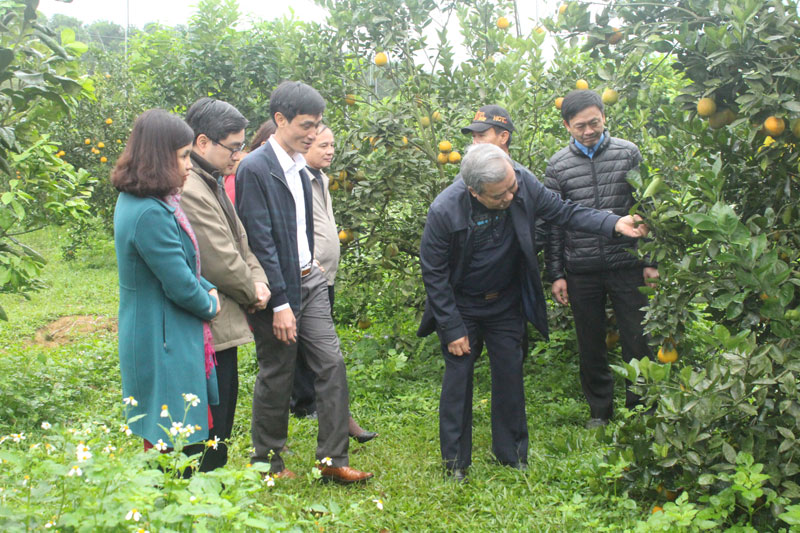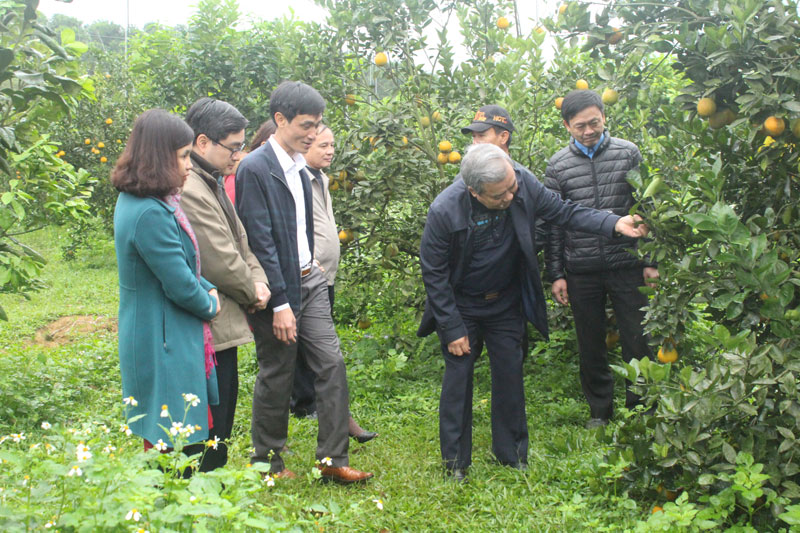
(HBO) - Over the past years, the agricultural structure in Lac Thuy district has been shifted in the right direction as seen in the growing proportions of animal husbandry and forestry. Local agriculture has been expanded in a comprehensive, effective and sustainable manner. In particular, intensive farming and polyculture have been boosted while concentrated farming areas have been formed to raise productivity, quality and value on a same area of land.
 Officials of the provincial Department of Agriculture and
Rural Development and Lac Thuy district visit an effective orange farming model
in Dong Uong hamlet of Thong Nhat commune.
Officials of the provincial Department of Agriculture and
Rural Development and Lac Thuy district visit an effective orange farming model
in Dong Uong hamlet of Thong Nhat commune.
Lac Thuy has carried out 11 priority programmes to develop
local key products; allocated more budget for agricultural restructuring;
formed value chains to enhance the production – consumption connectivity; and
increased the transfer and application of scientific – technological advances
to improve product quality, economic effectiveness and food safety.
To develop large-scale concentrated agricultural
zones, Lac Thuy has accumulated 315ha of farmland. Besides, it has formed
1,319ha of concentrated citrus cultivation areas, mostly in Thong Nhat, Phu
Nghia and Phu Thanh communes and Ba Hang Doi township.
A 100ha concentrated vegetable farming zone has
also taken shape, including existing areas in Dong Tam, Co Nghia and Lac Long
communes and new ones in Chi Ne township and Thong Nhat, Khoan Du and Hung Thi
communes. Additionally, Lac Thuy has also paid attention to promoting hi-tech
agriculture in Ba Hang Doi township. There, a 10,000sq.m greenhouse was built
by the Hoa Binh Gap Co. Ltd. Another greenhouse with an area of 30,000sq.m for
vegetable cultivation is also under construction in Lien Hoa commune.
Meanwhile, the district has tapped into the Song
Boi tea farming area, which covers 230ha of land mainly in Phu Thanh and Phu
Nghia communes and generates an output of 4,140 tonnes. A 30ha concentrated
custard apple farming zone in Dong Tam commune has also proved fruitful. Lac
Thuy is working to build certification trademarks for these tea and custard
apple specialties.
Apart from cultivation, programmes have also
been implemented to boost animal farming. As a result, chicken farming has
developed across the district, helping the local product initially gain a
foothold in the market. Local authorities have worked to form chicken farming
value chain and bring into play the certification trademark of Lac Thuy
chicken.
At the same time, goat farming has developed
well, turning the animal into a key product of the locality. The district is
also seeking a certification trademark for its goat product.
Besides, Lac Thuy has encouraged honey bee
farming with more than 10,000 bee colonies, producing some 100 tonnes of honey
in 2019./.
According to data from the Hoa Binh Provincial Party Committee, the industrial production index for the first six months of 2025 is estimated to have increased by 20% compared to the same period last year. This marks the highest year-on-year growth rate for this period since 2020.
In the first six months of 2025, Hoa Binh province’s export turnover was estimated at 1.145 billion USD, marking an 18.11% increase compared to the same period in 2024. Import turnover was estimated at $ 804 million, a 17.15% increase, which helped the province maintain a positive trade balance.
The lives of the ethnic minority farmers in Tan Lac district have gradually improved thanks to the new directions in agricultural production. This is a testament to the collective strength fostered through the professional associations and groups implemented by various levels of the district’s Farmers’ Union.
With the motto the "product quality comes first,” after nearly one year of establishment and operation, Muong village’s Clean Food Agricultural and Commercial Cooperative, located in Cau Hamlet, Hung Son Commune (Kim Boi district), has launched reputable, high-quality agricultural products to the market that are well-received by consumers. The products such as Muong village’s pork sausage, salt-cured chicken, and salt-cured pork hocks have gradually carved out a place in the market and they are on the path to obtaining the OCOP certification.
In the past, the phrase "bumper harvest, rock-bottom prices" was a familiar refrain for Vietnamese farmers engaged in fragmented, small-scale agriculture. But today, a new spirit is emerging across rural areas of Hoa Binh province - one of collaboration, organisation, and collective economic models that provide a stable foundation for production.
Maintaining growing area codes and packing facility codes in accordance with regulations is a mandatory requirement for agricultural products to be eligible for export. Recently, the Department of Agriculture and Environment of Hoa Binh province has intensified technical supervision of designated farming areas and packing facilities to safeguard the "green passport" that enables its products to access international markets.



 Officials of the provincial Department of Agriculture and
Rural Development and Lac Thuy district visit an effective orange farming model
in Dong Uong hamlet of Thong Nhat commune.
Officials of the provincial Department of Agriculture and
Rural Development and Lac Thuy district visit an effective orange farming model
in Dong Uong hamlet of Thong Nhat commune.